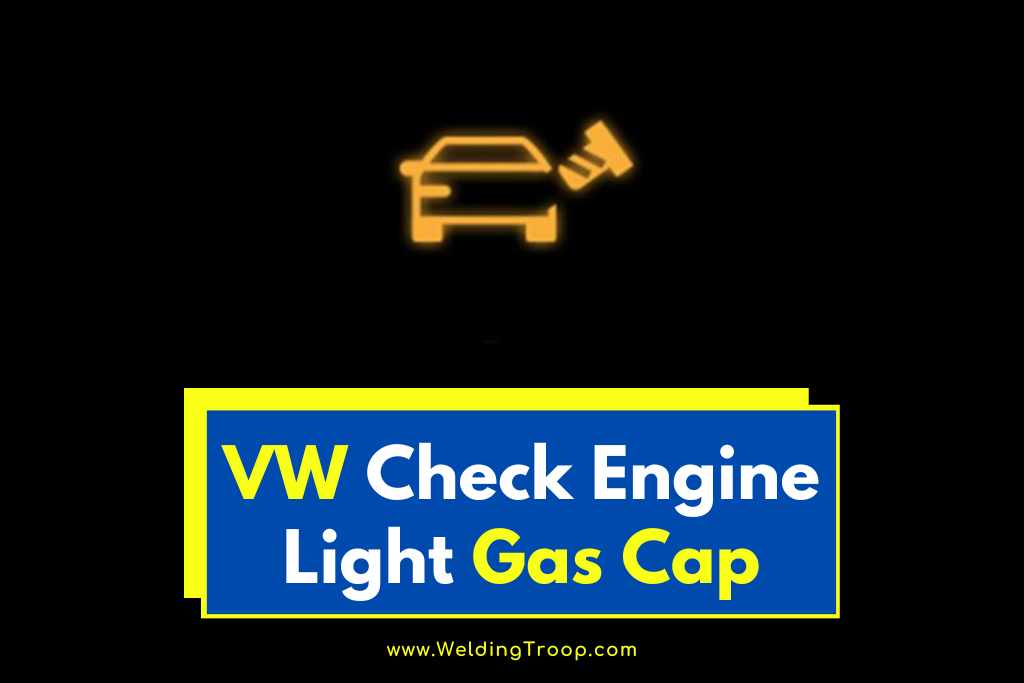Have you ever wondered what the VW check engine light gas cap means? Well, we got you covered.
The check engine light in your Volkswagen can be a source of concern and confusion for many drivers. This dashboard warning light indicates that there is an issue with your vehicle’s engine or related systems.
One common cause of this light coming on is a problem with the gas cap, but there could be other underlying issues as well.
In this comprehensive guide, we will explore the causes of the check engine light coming on, the role of the gas cap, and what you should do if you encounter this warning light in your Volkswagen.
Table of Contents
Check Engine Light Basics
Onboard Diagnostics (OBD) System
The check engine light is part of your vehicle’s onboard diagnostics (OBD) system. This system constantly monitors the performance of various engine components and emissions control devices.
If the OBD system detects an issue that it cannot correct, it will trigger the check engine light to alert the driver.
Understanding the Check Engine Light
The check engine light can appear as a solid or blinking light, and its color and location may vary by vehicle. In most cases, it is a yellow light shaped like an engine located on the dashboard.
A solid check engine light indicates a potential issue that should be addressed, while a blinking light signifies a more serious problem that requires immediate attention. In either case, it is essential to have your vehicle inspected by a professional to diagnose and resolve the issue.
Common Causes of the Check Engine Light
There are numerous reasons why the check engine light may come on in your Volkswagen. Some of the most common causes include:
Loose or Missing Gas Cap
The gas cap is responsible for sealing the fuel tank and preventing gas fumes from escaping into the atmosphere or the vehicle.
A loose or missing gas cap can trigger the check engine light when the fuel system tests itself for proper sealing. Ensure your gas cap is tight and in place to avoid this issue.
Malfunctioning Oxygen Sensor
The oxygen sensor, or O2 sensor, sends information to your car’s electronic control unit (ECU) about the air-fuel mixture.
If the sensor becomes covered in oil, dust, debris, or corrosion, it may fail and send incorrect information to the ECU, resulting in the check engine light coming on.
Worn or Damaged Spark Plugs and Wires
Spark plugs ignite the air-fuel mixture in your Volkswagen’s combustion chamber. Over time, spark plugs and wires can wear out and cause engine misfires, leading to the check engine light being triggered.
Faulty Mass Air Flow Sensor
The mass air flow sensor measures the amount of air entering the engine to determine the fuel needed for efficient operation.
A malfunctioning sensor can result in reduced performance and lower fuel economy, causing the check engine light to come on.
Catalytic Converter Replacement Needed
The catalytic converter helps protect the environment by converting harmful carbon monoxide into carbon dioxide.
When not functioning properly, a damaged catalytic converter can cause the check engine light to come on.
Broken Thermostat
The thermostat in your Volkswagen helps manage engine operating temperatures to prevent overheating. An incorrect reading from a faulty thermostat can trigger the check engine light.
Read also >> Engine Malfunction Light for Volkswagen (Causes, Symptoms, Solutions)
Read also >> VW Check Engine Light Codes (Common Car Diagnose + More)
Diagnosing and Turning off the Check Engine Light
It is essential to address a check engine light promptly to prevent further damage to your Volkswagen. Professional technicians at authorized Volkswagen service centers have the expertise and diagnostic equipment necessary to pinpoint the cause of the check engine light and recommend appropriate repairs.
Volkswagen Check Engine Light Flashing
A flashing check engine light indicates a severe engine misfire that can result in unburned fuel being dumped into the exhaust system, potentially damaging the catalytic converter.
This situation requires immediate attention, and you should contact your local Volkswagen service center for further assistance.
Volkswagen Check Engine Light Codes
When the check engine light comes on, your vehicle’s onboard computer stores a diagnostic trouble code (DTC) that identifies the issue. There are hundreds of possible DTCs, each corresponding to a specific problem with the vehicle.
Diagnosing the issue requires an experienced professional with the appropriate tools to read the code and determine the necessary repairs.
Some common issues that can trigger check engine light codes include:
- Transmission issues
- Old battery
- O2 sensor problems
- Fuel and air metering system faults
- Ignition system issues
- Emissions control problems
- Computer output circuit issues
- Loose or missing gas cap
- Bad spark plugs
Is it Safe to Drive with the Check Engine Light On?
The severity of the issue causing the check engine light to come on will determine whether it is safe to continue driving your Volkswagen.
If the cause is a minor problem, such as a loose gas cap, it should be safe to drive. However, if the check engine light is flashing or you notice a significant change in vehicle performance, it is recommended to have your Volkswagen serviced immediately to prevent further damage.
What Does the Check Engine Light Mean?
The check engine light is part of your vehicle’s diagnostic system and can indicate a variety of issues ranging from minor to severe.
Some common problems that can cause the check engine light to come on include a loose gas cap, engine knocking, or issues with the vehicle’s emissions control system.
If your check engine light is on, it is essential to have your Volkswagen inspected by a professional to determine the cause and recommend appropriate repairs.
Will the Check Engine Light Reset Itself?
In most cases, the check engine light will turn off if the issue that caused it to come on is resolved. For example, if a loose gas cap triggered the light, tightening the cap should cause the light to turn off after driving a certain distance.
If the light does not turn off after addressing the issue, it may be necessary to have your vehicle inspected by a professional to reset the light and ensure the problem has been resolved.
Check Engine Light Service for Volkswagen
If your Volkswagen’s check engine light comes on, it is essential to have your vehicle inspected by a professional to diagnose and address the issue.
Ignoring the warning light can result in significant damage to your vehicle’s engine and other components, leading to costly repairs.
Potential Causes of the Check Engine Light in a Volkswagen
There are numerous potential causes for the check engine light to come on in your Volkswagen. Some of these include:
- Mass airflow sensor issues
- Low or dead battery
- Loose or missing gas cap
- Faulty spark plugs or wires
- Aftermarket item problems
- Damaged catalytic converter
- Bad O2 sensor
- Vacuum leak
What is the code for the bad gas cap?
The error code for a loose or faulty gas cap can vary depending on the make and model of the vehicle. However, a common code that may indicate a loose gas cap is “P0440.”
Additionally, a “P0457” code may also indicate a loose gas cap, but it can also be caused by other issues with the EVAP system.
It is important to properly diagnose the issue before assuming that it is solely due to a loose gas cap. In any case, it is recommended to promptly replace a faulty or improperly sealed gas cap to avoid safety hazards and ensure emissions compliance.
What happens if you don’t replace the gas cap?
If you don’t replace the gas cap, it can lead to various issues. For instance, it can cause fuel to evaporate, reduce fuel efficiency, and trigger the check engine light.
Additionally, if you go too long without a gas cap, it could potentially harm your vehicle’s performance. In some cars, the missing gas cap can influence the car’s tech and sensors, causing the vehicle to run poorly.
Moreover, failing to replace a gas cap can result in an error code, such as “P0440” and “P0457,” indicating a loose or damaged gas cap. It is important to promptly replace a faulty or improperly sealed gas cap to avoid safety hazards and ensure emissions compliance.
How Many Miles Can You Drive with the Check Engine Light On?
The number of miles you can drive with the check engine light on will depend on the severity of the issue causing the light to come on.
It is essential to address the problem as soon as possible to prevent further damage to your vehicle. If the check engine light is flashing, it is recommended to pull over and contact a Volkswagen service center for assistance.
How Much Does It Cost to Get the Check Engine Light Checked?
The cost of diagnosing the check engine light will vary depending on the specific issue and the service center you visit. However, many Volkswagen service centers offer complimentary multi-point inspections and free diagnostics to help determine the cause of the check engine light.
In conclusion, the check engine light is an essential warning system in your Volkswagen designed to alert you to potential issues with your vehicle.
By understanding the common causes of the check engine light and addressing the problem promptly, you can help prevent costly repairs and keep your Volkswagen running smoothly.
How do I know if I need a new gas cap?
If you notice a gasoline odor while driving or if you see the “Check Engine” light on your dashboard, it could be a sign that your gas cap is faulty or not sealed properly.
A loose gas cap is the most common cause of these problems. You may also experience a decrease in fuel efficiency due to the evaporation of gasoline.
If you suspect that your gas cap is faulty, it is important to replace it promptly to avoid safety hazards and to ensure that your car passes emissions inspections.
Gas caps are affordable and easy to replace, with most universal models costing between $10 and $13.
How many times should you click your gas cap?
The gas cap should generally be tightened around 3-5 clicks to ensure it is secure. The cap is supposed to click more than once if you keep turning it and you need to tighten it until it clicks several times.
In sensitive cars nowadays, it is recommended to tighten the gas cap up to 6 clicks to make sure it is properly sealed, or else it may cause the car to throw a CEL (Check Engine Light).
Check Engine Light? Why the Gas Cap is a Common Cause! >> Check out the video below:

